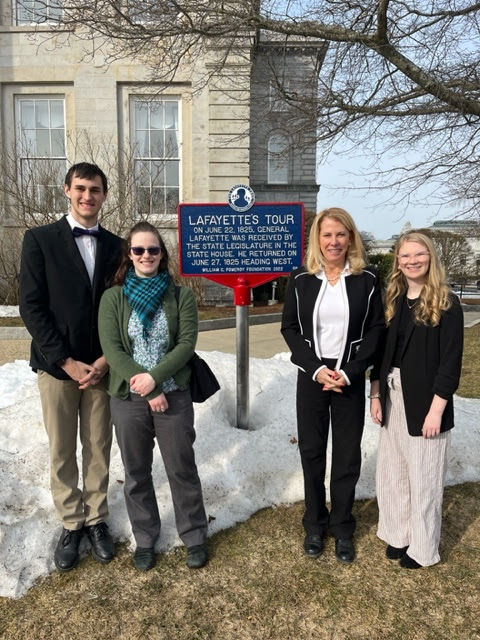Lafayette Day: Celebrating Franco-American Friendship
- Kaleb Houle-Lawrence
- May 10, 2024
- 4 min read
Updated: Mar 11, 2025

May 20th marks the New Hampshire celebration of the 200th anniversary of Lafayette’s American Tour, the basis of the holiday. Other states have differing days to celebrate the holiday (often based on when he visited). New Hampshire’s date is set to the date of his death. This holiday is an important reminder of the Franco-American friendship that brought the United States to life during the late 18th century and helped kickstart the “Age of Revolution,” which led to revolutions such as the French Revolution and the Haitian Revolution.
The Man Behind the Holiday
Marquis de Lafayette was a French aristocrat, born to a noble family in Auvergne. He was a member of the inner circles of King Louis XVI. Wanting to prove his own glory, he self-financed a journey across the Atlantic Ocean – to the United States. There, he joined the Continental Army as a major general. Lafayette became very close to General George Washington, who eventually gave the Frenchman his own troops. Lafayette led several battles, including one skillfully-executed retreat from Barren Hill in 1778.
Upon his 1779 return to France, Lafayette played a major role in convincing the French government to join the cause and send increased troops and supplies to the colonies. In April of 1780, Lafayette returned to the colonies with 6,000 French infantry and six ships. Alongside American commanders, Lafayette was a key player in trapping the British in Yorktown in July of 1781, the ultimate location of surrender that October.
Revolution at Home
During the Estates-General of 1789, Lafayette supported the revolutionary body of the National Assembly. Alongside Thomas Jefferson, Lafayette helped write the Declaration of the Rights of Man and of Citizen. Soon after, he was elected as the commander of the national guard of Paris. However, he would later resign in 1791 when his troops opened fire on a crowd of protesters who were demanding that Louis XVI resign.
During Maximilien de Robespierre’s Reign of Terror, Lafayette fled to Austria. The nation would harbor him until 1797, once the Reign of Terror was over. He then returned to France, but retired from public life in protest of the regime of Napoleon Bonaparte. Rumors circulated that Lafayette received a special offer from Thomas Jefferson in 1803. Recently having acquired the Louisiana Territory, Jefferson sought the leadership of Lafayette and requested him to take over governship. Lafayette declined.
Lafayette’s Tour
Twenty years later, Lafayette would receive another Presidential invitation to visit the United States. President James Monroe, an old friend of the Frenchman, requested that he visit and undergo a national tour. Thousands of Americans gathered around city squares and large monuments to greet the American hero. The tour consisted of visits to all 24 states (nearly twice as many as when Lafayette was last on American soil). Lafayette’s tour also made stops at important places to him such as Washington’s grave and Monticello, where he reunited with Thomas Jefferson. Lafayette was the first foreign citizen to address the U.S. House of Representatives; he was also naturalized as an American citizen by the Legislature. A bust of Lafayette resides in the Capital’s rotunda; his bust was the first to be created, and all other original busts were modeled after the style of Lafayette’s. Furthermore, dozens of cities and locations across the nation are now named in his honor.
Celebrating Franco-American Friendship
The holiday to commemorate Lafayette and all his contributions to America was created in New Hampshire in 1955. The law requires the governor to share an annual proclamation to call for its observance every 20th of May. The goal of New Hampshire’s holiday, and others around the nation, is to commemorate the impacts of Lafayette on American and French society alike, but also to memorialize the deep connections between the two nations.
This year, the FAC, alongside many other NH-based and national organizations, are organizing a celebration in honor of the distinguished hero. Please join us in celebrating this moment of friendship on May 20th at 3:00pm at the State House Yard and later the Representatives Hall. More details and an RSVP form can be found here. The event flyer can be seen below.
Lafayette Day is just one way to recognize the immensely dense history of friendship and cooperation between the United States and France. The story of Marquis de Lafayette is an inspiration to the Franco-American connection and is widely under-reported. Commemorating his actions, but further the connection between these two nations is important in remembering our collective history. Keep calm and soyez fière d’être Franco-Américan (be proud to be Franco-American)!


Written by Kaleb Houle-Lawrence
University Intern





Comments